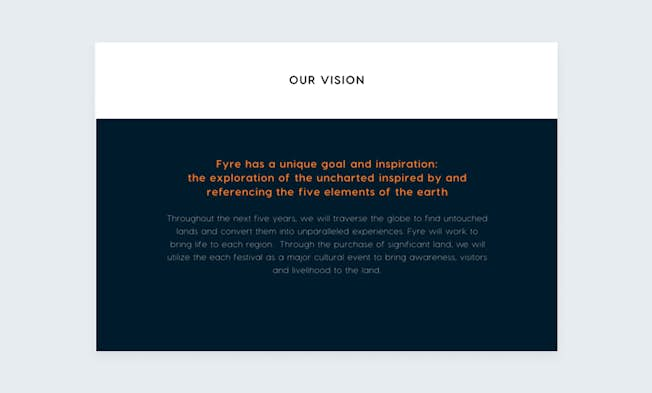Jul 2, 2018
The Fyre Festival & Authenticity in Marketing
“Authentic brands don’t emerge from marketing cubicles or advertising agencies. They emanate from everything the company does.” Howard Schultz, Executive Chairman of Starbucks
It’s no secret that we live in a world dominated by the hyperconnectivity of digital platforms, devices, and services.
As such, the contemporary consumer is more empowered than ever before, with the ability to access a wealth of information or spark up a dialogue with a peer at any time, anywhere in the world.
That said, the days of the static advert or sales message are long gone. These days, we live in a society where consumers crave honesty and transparency, and choose brands or businesses that match their personal ideals.
Promises Are Important
In 2018, consumer trust goes directly to the bottom line. In fact, in a recent Label Insight study, 56% of respondents confirmed that extra product information inspires more trust in a given brand. Moreover, 81% confirmed that they would be willing to sample a brand’s whole product range if they were comfortable with its degree of transparency.
Given the wealth of promotional platforms available to today’s brands, the scope for creating inspiring, engaging, and even dazzling multichannel digital marketing campaigns is enormous.
Dynamic, content-centric digital marketing campaigns provide a prime opportunity to showcase a brand’s value, plug its USPs, and communicate its core messages in a meaningful way. That said, regardless of how inspiring your marketing campaign might be, there will be consequences if you don’t deliver on your core promises.
Around eight in 10 adults (83%) state they would stop using a brand after a single bad experience, while almost nine out of 10 adults (87%) agree that they would look elsewhere if a brand made them unhappy in any way.
When planning and creating content for your digital marketing plan, it’s easy to make grandiose claims and significant promises to your prospects; but without action or delivery, your efforts will be redundant.
To put this point into perspective, consider the following example of huge expectations and underwhelming realities.
Expectations vs Reality: The Marketing Disaster of Fyre Festival
The Fyre Festival had all the key ingredients of a great digital marketing campaign: an inspiring, emotive brand message, stunning visual assets, strong influencer endorsement, and consistently exceptional content across a host of channels. And at the time, it worked.

Regrettably, the entire campaign was based on smoke and mirrors.
The expectation
A cutting-edge luxury festival for the elite; an unparalleled VIP experience framed by the picture-postcard backdrop of Great Exuma in the Bahamas.
For $1,200, attendees were promised a trip including transformative music and the creation of one-of-a-kind immersive memories in paradise. Guests were told they would be flown to a private island on a custom, VIP-configured Boeing 737, before being treated to amazing accommodation and a gastronomical experience unlike any other.
It was coined as an event that would exceed all expectations.
The reality
Upon arrival, the vast majority of guests were left scrambling for their luggage in the dead of night, before being ushered like cattle to a festival site with cheap, sagging marquees and half-assembled tents.
The Fyre Festival site was unattractive and underwhelming and quickly descended into chaos. Rather than enjoying headline band Blink 182 (the band had pulled out the week leading up to the festival), the guests had to endure poor substitutes; and rather than a gastronomical experience that was out of this world, the festival goers were served up soggy cheese sandwiches topped with wilting lettuce.
Many guests decided to flee the festival but got stranded at the airport for extended periods, with little food or water.
Instead of an event that managed to exceed all expectations, Fyre Festival was a complete disaster – upsetting, traumatizing, and disappointing droves of victims lured in by its big-budget marketing campaign.
The results
In addition to failing to deliver on any of his promises and earning the most negative consumer press imaginable, event-organizer Billy McFarland was arrested and subsequently charged with wire-fraud.
McFarland defrauded 80 investors plus a ticket broker out of more than $26 million. Not only this, but he misled a number of investors who poured more than $1 million into Fyre Media – the entity behind the marketing campaign, and the festival.
He faces 10 years in jail.

Delivering on Your Digital Marketing Promises
While Fyre Festival is an extreme case of misleading marketing, it’s clear that failing to deliver on your marketing promises is perhaps the biggest mistake a brand, business, or organization can make.
In a time where transparency reigns supreme and consumers value the opinion of their peers above all else, it’s vital to portray your reality, rather than a glitzy representation of your reality. A bad customer experience travels across the digital realm like wildfire, and in some cases, droves of poor testimonials can destroy the reputation of a brand, almost overnight.
Given that there have never been better tools for brand storytelling, it is easy for a business to get carried away and over-promise; but striking a happy medium between inspiring marketing and brand authenticity is the key to long-term success.
But how do you win over valuable prospects while matching up to consumer expectations? Here we explore ways in which you can make your marketing campaign a success while remaining credible.
Inform: Before your marketing campaign can be considered credible externally, it must be deemed credible internally. That said, once you’ve mapped out your campaign’s framework, aims, goals, and promises, you should conduct an internal audit. By doing so, you’ll gain valuable insights from a number of key stakeholders across the business, including the ability to gauge whether your brand promises are both realistic and feasible to deliver at every touchpoint of the customer journey. Should any red flags be raised, you will be able to make vital amendments before your campaign gets off the ground.
Examine: Once you’ve decided on a campaign message and a set of promises you know your business can deliver on, you should look at every cog in the marketing machine. Collaborate with every relevant department in the business, examining how you will deliver on your promises at each stage of the customer journey, from first contact to conversion and aftercare. If any logistical, technical, service, or communicative issues are identified early on, you’ll be able to resolve them before your campaign’s launch.
Engage: 90% of a company employee’s social audience is new to the brand. If your staff is invested in the business’s campaign message and understand its values and objectives, you will gain a host of brand advocates that will not only help you deliver your message with transparency, but will add a deeper dimension of authenticity to your campaign. Hold workshops and meetings to communicate the campaign with everyone within the business, providing social media training if required. If everyone is pulling towards the same common goal, is engaged, and is onboard, you will be far more likely to deliver a message that resonates with your audience – and actually delivers on its promises.
It costs a company five times more to attract a new customer than it does to retain an existing customer. By investing in a marketing campaign with expectations that match reality, you stand to forge long-lasting consumer relationships based on trust and loyalty – and these are the most valuable of all.
“To be persuasive, we must be believable; to be believable, we must be credible; to be credible, we must be truthful.” Edward R. Murrow, American broadcast journalist and war correspondent, 1908 - 1965
Despite the fact that he wasn’t a digital marker, Edward R. Murrow’s message rings truer than ever, and by using this notion as the foundation of every one of your digital marketing efforts, you stand a fighting chance of living up to your campaign’s expectations.
We’ve covered one of the biggest marketing blunders of all time. To inspire your own efforts in a positive way, here are two examples of brand messages that have managed to deliver.
Walmart: “Save money. Live better.”
By coupling its core promise of low prices with emotional benefits, US budget department store Walmart offers its customers a better quality of life with easy access to the necessities. Its marketing strapline (or promise) is transparent, offers value, and – most importantly of all – it’s authentic.
H&M: “More fashion choices that are good for people, the planet and your wallet.”
According to Karl-Johan Persson, CEO of H&M: “We have set ourselves the challenge of ultimately making fashion sustainable and sustainability fashionable.” With affordable, good-quality products crafted from sustainable, ethically-sourced materials, H&M delivers on its brand promises on a consistent basis.
Many businesses don’t deliver exceptional customer experiences, despite setting high consumer expectations – turning great marketers into liars. It’s a sad truth, but one that you can avoid.
By making sure that your marketing messages live up to reality, communicating a tangible level of value with each action you take, you will benefit from the rewards of long-term success. Failure to do so could result in disaster.
Key Notes
Around eight in 10 adults (83%) state they would stop using a brand after a single bad experience. Earning long-term customer loyalty requires consistency, transparency and authenticity.
Regardless of budget, innovation, and how inspiring your campaign assets may be, your marketing efforts will be worthless if you don’t deliver on your promises.
Fyre Festival is a testament to that fact.
Through internal collaboration and staff buy-in, you will be able to iron out any potential weaknesses or untruths before launching your campaign – and deliver a brand message steeped in authenticity.
It costs a company five times more to attract a new customer than it does to retain an existing customer. Delivering on your marketing promises will earn you the kind of loyalty that will boost brand awareness and help you to grow and develop over time.
Related
Upgrade to Power Membership to continue
your access to thousands of articles, toolkits, podcasts, lessons and much much more.
Become a Power Member- Login
- View Courses
- - - -
- Courses
- Resources
- - - -
- My Account
- Change Password
- Logout





